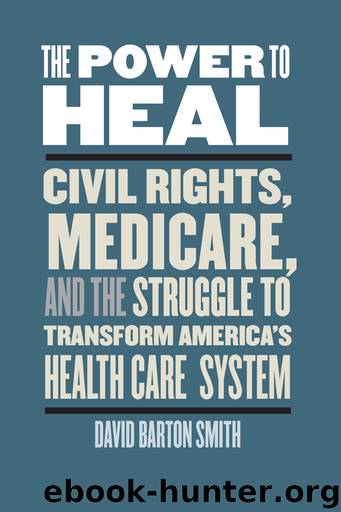The Power to Heal by David Barton Smith

Author:David Barton Smith
Language: eng
Format: epub
Publisher: Vanderbilt University Press
Published: 2016-04-18T04:00:00+00:00
5
Casualties
Health care’s struggle blended into all the other parts of the larger civil rights struggle. It didn’t end with Medicare’s triumphal children’s crusade any more than the triumphal march from Selma to Montgomery ended the struggle for voting rights. It continued, contested each step of the way, burdened by the loss of the broader optimism that had energized the earlier days of the movement. The Vietnam War, urban riots, white backlash, and growing deficits all added to the discouragement. Change became harder. It involved, to start with, mopping up after early, easier successes.
Mopping Up
On July 1, 1966, the Medicare Program included about sixty-five hundred participating hospitals, 250,000 physicians, twelve hundred home health agencies, seventy-four Blue Cross organizations, thirty-three Blue Shield plans, sixteen insurance companies, and over one hundred prepaid group practices (HMOs) (Ball 1966a, 475). Ninety-seven percent of the short-term general hospital beds in the country were Title VI compliant and participating in the program. In the South, between 200 and 250 hospitals had yet to be certified for compliance. In about one hundred communities in the South less than 75 percent of the beds had been brought into compliance with Title VI, and in a few communities no beds were in compliance, and only emergency admissions to noncompliant hospitals received Medicare payment. (Emergency admissions to nonparticipating hospitals were all concentrated in the South, and it took several years to fully eliminate the use of “emergency” admissions as a way to circumvent Title VI compliance.) While this involved less than 3 percent of the beds, as Social Security commissioner Ball acknowledged, the impact on these communities was serious. “The Public Health Service and I know the American Hospital Association and state associations stand ready to give whatever help we can in bringing about the voluntary compliance of the last 200 or 250 hospitals now not able to participate for civil rights reasons” (Ball 1966a, 476).
Commissioner Ball was also busy responding to complaints and closing loopholes in Title VI enforcement. Complaints to southern senators and congressmen forwarded to Ball from constituents produced prompt, firm, but courteous responses.1 A constituent complaint sent on June 8, 1966, to Georgia senators Tallmadge and Russell by a recent retiree familiar with his former employer’s private insurance coverage was representative:
Actually only 48 hospitals in Georgia have been cleared to accept Medicare patients on July 1 and it is being intimated that most, if not all large private hospitals in Atlanta may not choose to qualify due to the red tape and the unreasonable attitude of the Federal Government. Two very small hospitals in the Atlanta metropolitan area have been cleared.
The Federal Government has misrepresented Medicare all along by telling us we have a choice of doctor and hospital. This was when they were turning themselves inside out trying to get everybody to sign up for Medical Insurance (Part B). However this is not the case now. They are apparently asking and expecting hospitals to integrate both hospital personnel and their patients—in other words, integration all the way.
Download
This site does not store any files on its server. We only index and link to content provided by other sites. Please contact the content providers to delete copyright contents if any and email us, we'll remove relevant links or contents immediately.
| Anthropology | Archaeology |
| Philosophy | Politics & Government |
| Social Sciences | Sociology |
| Women's Studies |
The Secret History by Donna Tartt(19039)
The Social Justice Warrior Handbook by Lisa De Pasquale(12185)
Thirteen Reasons Why by Jay Asher(8887)
This Is How You Lose Her by Junot Diaz(6873)
Weapons of Math Destruction by Cathy O'Neil(6263)
Zero to One by Peter Thiel(5786)
Beartown by Fredrik Backman(5737)
The Myth of the Strong Leader by Archie Brown(5495)
The Fire Next Time by James Baldwin(5429)
How Democracies Die by Steven Levitsky & Daniel Ziblatt(5211)
Promise Me, Dad by Joe Biden(5141)
Stone's Rules by Roger Stone(5080)
A Higher Loyalty: Truth, Lies, and Leadership by James Comey(4948)
100 Deadly Skills by Clint Emerson(4917)
Rise and Kill First by Ronen Bergman(4777)
Secrecy World by Jake Bernstein(4739)
The David Icke Guide to the Global Conspiracy (and how to end it) by David Icke(4699)
The Farm by Tom Rob Smith(4501)
The Doomsday Machine by Daniel Ellsberg(4484)
